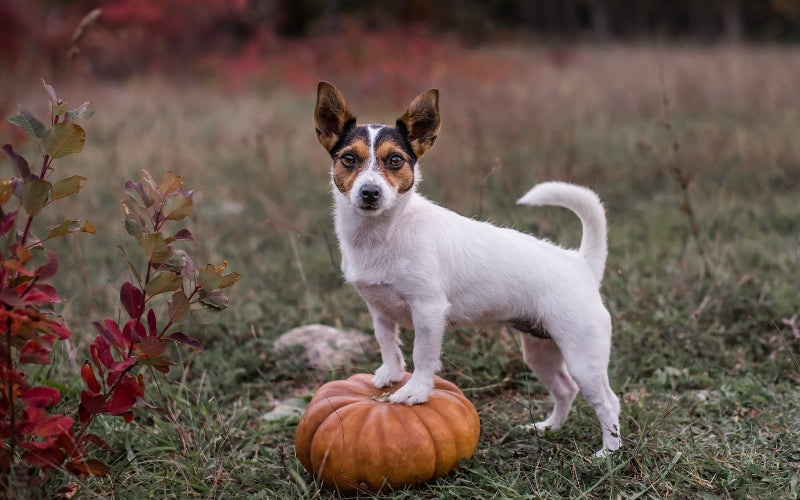We are used to seeing pumpkins spring up everywhere at Halloween, glowing brightly from within windows and porches.
We may even enjoy a pumpkin latte from time to time or a bowl of comforting pumpkin soup during the chilly winter months.
But as you tuck into your delicious warming lunch and your canine companion looks on curiously with hopeful eyes, have you ever wondered ‘can dogs eat pumpkin too’?
Good news! The answer is yes, dogs can eat pumpkin. It’s a great addition to a homemade dog diet and also has plenty of health benefits.
Read on to find out how pumpkin can nourish your dog, why it's so good for them and how to prepare pumpkin for optimal taste and absorption of nutrients.

Is pumpkin good for dogs?
Most dog owners will first stumble upon the benefits of pumpkin when their canine companion is struggling with digestive issues. In fact, it’s often recommended by vets as a simple and effective home remedy.
Pumpkin is full of fibre - both soluble and insoluble - which can assist dogs who are suffering from either mild constipation or mild diarrhoea. It does this by softening the stool or creating bulk, as well as working as a powerful gut-healing prebiotic.
Additional benefits of fibre include helping your dog express their anal glands naturally, which protects against anal disease or long term issues.
It also helps your dog feel fuller for longer. This is especially useful if they are overweight and you are trying to reduce their food intake.
Perhaps most interestingly, pumpkin is great for the bladder. Its vast combination of vitamins, minerals and antioxidants support urinary health and help to prevent urinary tract infections, as well as painful kidney and bladder stones.
And it’s not just the vibrant orange flesh of the pumpkin that is packed with nutrients.
Pepitas, which are found in shell-less or hulless pumpkin varieties, are also a powerful superfood for dogs.
What are pepitas?
Pepitas are a natural source of omega fatty acids, which are essential for:
- Healthy skin and joints
- Brain function
- Heart health
Not only that, pepitas are also anti-inflammatory, meaning they are great for dogs with:
- Arthritis
- Intestinal issues
- Anal gland disease
When it comes to nourishing the body, that also extends to nourishing the mind. Pepitas really excel in this area due to their tryptophan content, which converts into GABA in the brain.
Tryptophan is used by the body to produce serotonin and melatonin, thus reducing the symptoms of anxiety and helping to induce sleep. This can be especially helpful for dogs with separation anxiety.
Pepitas are also believed to be a holistic treatment for intestinal parasites, according to scientific studies.
Did you know that pepitas are a key ingredient in Wellbeing Essentials Complete 22? By simply adding the correct amount to your dog’s homemade meals (based on their weight), they will absorb all of the wonderful health benefits of pepitas and so much more!

What are the nutritional benefits of pumpkin?
Like many other yellow and orange vegetables, pumpkin is a good source of vitamin C, iron and beta-carotene, which dogs (and humans) convert into vitamin A.
Vitamin A is an essential vitamin for dogs and maintains optimal health, especially for pregnant females and growing puppies. It benefits everything from skin and coat to muscles and nerves.
Meanwhile, the high level of potassium found in pumpkin also offers a host of health benefits. As well as regulating your dog’s blood pressure, it can also assist with metabolism.
Pumpkin is a low calorie vegetable and contains no saturated fats or cholesterol, plus it’s a natural antioxidant.
In short, it’s a perfect vegetable to introduce into your dog’s homemade diet. Even better, it’s tasty too!
How to prepare pumpkin for dogs
It’s very easy to prepare pumpkin and incorporate it into your canine companion’s meals. We usually choose to remove the seeds (they can be roasted separately), cut it into chunks, wash it and then steam it. This makes for a delicious dinner!
Be mindful that raw pumpkin and its skin can be difficult for dogs to digest and can be a choking hazard. So it’s always best to cook it and remove the skin before serving.
If you are using canned pumpkin, be sure that it doesn’t contain any sugar, xylitol, spices or additives that could make your dog sick.
You could even try using pumpkin as a meal topper or turning it into a healthy homemade dog treat, stuffing it into a Kong or freezing it into a popsicle along with banana and peanut butter for extra enrichment.

In conclusion
Pumpkin (including pepitas) is full of vitamins, minerals and antioxidants for optimal dog health.
From soothing digestive discomfort and dog symptoms to maintaining healthy skin, coat, muscles and nerves, this vibrant orange vegetable is an exceptional all-rounder. It can even keep their bladder and urinary tract healthy, as well as boosting mental health.
Pumpkin is a tasty addition to your dog’s natural real food meals and can be offered in a variety of ways, including as a healthy homemade dog treat.
Want to learn more about vegetables and the health benefits of preparing your dog’s meals at home? Download our free eBook for all the tips and information you need.




